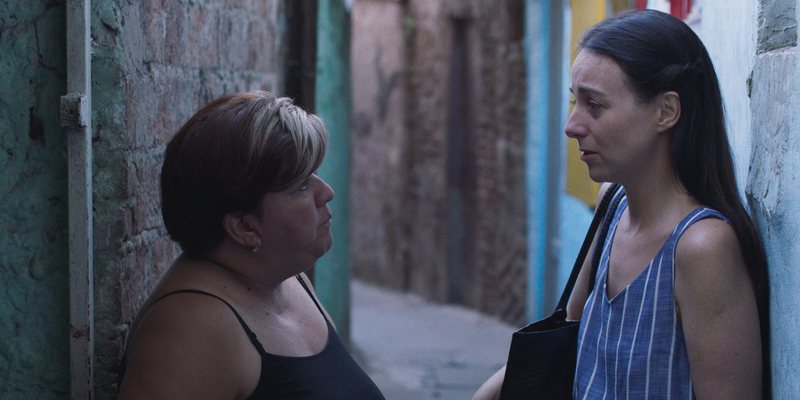
Review by
Eric Hillis
Directed by: Francisco Márquez
Starring: Elisa Carricajo, Mecha Martinez, Eliot Otazo, Ciro Coien Pardo, Cecilia Rainero

As young children we're taught by our teachers and religious leaders
that we should be kind to strangers. At home however, our parents tell
us the complete opposite, that strangers are a menace to be feared.
Sure, we hear horror stories of children abducted from holiday homes,
women bundled into cars and men stabbed by muggers, but such cases are
so rare that they inevitably create headlines which fuel tabloid
hysteria. The truth is that most victims of violence are on intimate
terms with their attackers. A child is more likely to be abused by the
friendly local priest than some raincoat clad pervert in a playground,
and a woman is infinitely more likely to be assaulted by her husband or
partner in her own home than by some lurker in a dimly lit alley.
"Stranger danger" may be largely a myth, but the damage has been done
and we now live in eternal mistrust of anyone we're not on familiar
terms with.
Who then could blame a woman living alone for not answering the door to
a young man who knocks furiously in the middle of the night? In
Argentine director Francisco Márquez's
A Common Crime, the woman in question blames herself when her failure to answer a
call for help has drastic consequences.

Cecilia (Elisa Carricajo) lives a comfortable middle class life.
She lectures on economics at a local college and spoils her young son
with gifts and trips to the fairground. Her only worry in life is
whether she'll impress her superiors enough to win a coveted promotion
at the university.
Cecilia's privileged world is shattered when she is woken one night by
a knocking at her door. Looking through the window she sees it's Kevin
(Eliot Otazo), the teenage son of her housekeeper/babysitter Nebe
(Mecha Martinez), whom she has only briefly met once before.
Cecilia ignores him and goes back to bed, forgetting about the incident
until she returns home the following day to find Nebe has disappeared.
Turning on the news, she learns that Kevin's body has been fished out of
a nearby river, and that the locals of his barrio hold the police
responsible for his death.

Unable to tell Nebe what occurred that fateful night, Cecilia spends
the rest of the movie in a tortured daze.
A Common Crime is as Catholic as cinema gets, its
protagonist racked with guilt over something nobody would blame her for,
except perhaps the boy's mother, which is why Cecilia keeps mum on the
subject. Cecilia however, appears to belong to middle class Argentina's
post-Catholic society, and so confession isn't an option. Márquez forces
us to question whether we would have acted differently, and I suspect
most of us won't like our answer.
Carricajo is immense as Cecilia, portraying her transition from a woman
who has had the privilege to avoid the realities of life and immerse
herself in the cloistered world of academia, to someone for whom
injustice has literally arrived on her doorstep.

In his previous feature,
The Long Night of Francisco Sanctis, Márquez dealt explicitly with the "disappeared", those who vanished
during the years of Argentina's military junta. Though
A Common Crime is set in modern day Argentina, it's very
much dealing with the ghosts of that era, how those who kept silent are
haunted by the spirits of the dead. Márquez employs techniques that make
his film adjacent to horror, with Cecilia hounded by whispers in her
head and even the dead boy's clothes mysteriously appearing in her back
garden. At one point Cecilia becomes trapped in the winding alleyways of
Nebe's barrio as though they've closed in on her like the woods in
The Blair Witch Project. There's something of Polanski's Repulsion to Cecilia's
increasingly fragile state. In the film's closing moments she finds a
way to escape her thoughts through an adrenaline rush, but you get the
feeling it's only a momentary reprieve. Like her nation, Cecilia will be
forever haunted by the injustice linked to her inaction.


